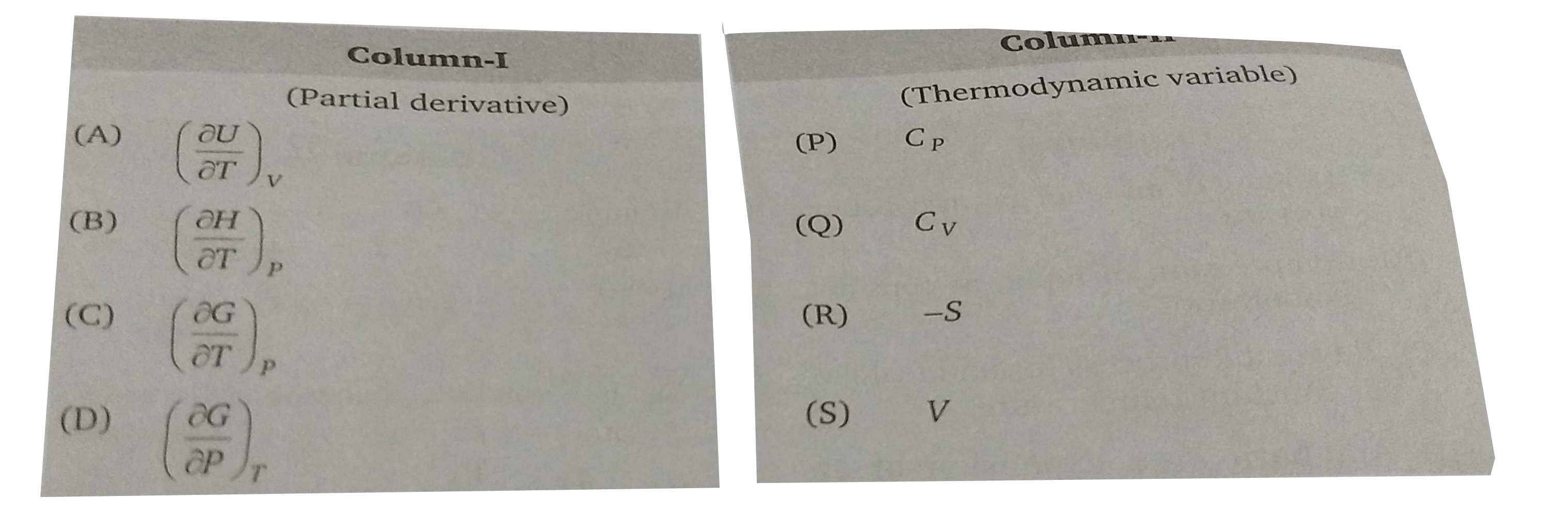19 gm of ice is converted into water at and 1 atm. The entropies of and are 38.2 and respectively. The enthalpy change for this conversion is : Solution in Punjabi
None of these
The correct Answer is:A
At equilibrium
Topper's Solved these Questions
- BOOK - NARENDRA AWASTHICHAPTER - THERMODYNAMICSEXERCISE - Level 3 - One Or More Answers Are Correct1videos
THERMODYNAMICS
- BOOK - NARENDRA AWASTHICHAPTER - THERMODYNAMICSEXERCISE - Level 3 - Match The Column2videos
THERMODYNAMICS
- BOOK - NARENDRA AWASTHICHAPTER - THERMODYNAMICSEXERCISE - Level 2 (Q.1 To Q.30)1videos
THERMODYNAMICS
- BOOK - NARENDRA AWASTHICHAPTER - STOICHIOMETRYEXERCISE - Level 3 - Subjective Problems20videos
STOICHIOMETRY
Similar Questions
Assume ideal gas behaviour for all the gases considered and neglect vibrational degrees of freedom. Separate equimolar sample. Separate equimolar samples of Ne, O2 , CO2 and SO2 were subjected to a two process as mentioned. Initially all are at same state of temperature and pressue.
Step I → All undergo reversible adiabatic expansion to attain same final volume, which is double the original volume thereby causing the decreases in their temperature.
Step → After step I all are given appropriate amount of heat isochorically to restore the original temperature.
Mark the correct option(s) :05:54View SolutionMatch the following columns
 04:09View Solution
04:09View SolutionWrite structure of 2,2-dimethylheptane.
04:57View SolutionWhat volume of a liquid (in L) will contain 10 mole ? If molar mass of liquid is 280 and its density is 1.4 g/mL.
03:16View SolutionOne mole of ice is converted into water at 273K . The entropies of H_2O(s) and H_2O(l) are 38.20 and 60.01Jmol^(-1)K^(-1) respectively. The enthalpy change for the conversion is:
02:46View SolutionWhich of the followingk is true for the process H_(2) O (s) = H_(2) O (l) at 0^(@)C and 1 atm?
01:16View SolutionFor the transformation, H_(2)O(l,1 atm) "to H_(2)O (g,1atm), DeltaH_(vap)=40.668kJmol^(-) The change in entropy (JK^(-)mol^(-)) is:
02:07View SolutionCalculate the change in enthalpy for the following process at 1 atm
H2O(1,50∘C)→H2O(g,150∘C) given that ΔHv at 100∘C is 40.7kJmol−1
Cp(H2O,l)=75.0Jmol−1K−1
Cp(H2O,g)=33.3Jmol−1K−105:51View Solution19 gm of ice is converted into water at 0∘C and 1 atm. The entropies of H2O(s) and H2O(l) are 38.2 and 60J/mol K respectively. The enthalpy change for this conversion is :
02:27View SolutionOne mole of ice is converted into water at 273 K. The entropies of H_(2)O(s) and H_(2)O(l) are 38.20 and 60.01 J mol^(-1)K^(-1) respectively. Calculate the enthalpy change for this conversion a ?
02:39View SolutionEnthalpy change for the process,
H2O(ice)⇔H2O(water)
is 6.01 kJ mol−1. The entropy change of 1 mole of ice at its melting point will be02:20View SolutionFor the melting of ice at 25∘C:
H2O(s)→H2O(l)
The enthalpy of fusion is 6.97kJmol−1 and entropy of fusion is 25.4Jmol−1K−1.Calculate the free energy change and predict whether melting of ice is spontaneous or not at this temperature.03:06View SolutionOne mole of ice is coverted into water at 273 K. The entropies of H2O(s)andH2O(l) are 38.20 and 60.01Jmol−1K−1 respectively.
The enthaply change for the conversion is02:20View Solution18g of ice is converted into water at 0∘C and 1 atm. The entropies of H2O (s) and H2O (l) are 38.2 and 60J/mol K respectively. The enthalpy cange for this conversion is:
02:20View SolutionOne mole of ice is converted into water at 273 K. The entropies of H_2O_((s)) and H_2O_((l)) are 38.20 and 60.01 J mol^(-1)K^(-1) respectively. The enthalpy change for the conversion is
02:58View Solution19 gm of ice is converted into water at 0^(@)C and 1 atm. The entropies of H_(2)O(s) and H_(2)O(l) are 38.2 and 60 J//"mol " K respectively. The enthalpy change for this conversion is :
01:49View Solution

